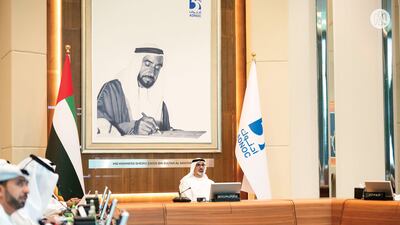Sheikh Khaled bin Mohamed, Crown Prince of Abu Dhabi, has approved Adnoc’s plan to reach net zero emissions by 2045, bringing the deadline forward from its previous target of 2050.
The state-run energy company also aims to reach zero methane emissions by 2030, the Abu Dhabi Media Office said on Monday.
“Adnoc is the first company in its peer group to accelerate its net zero target to 2045,” it said.
Sheikh Khaled, who is also the chairman of the Abu Dhabi Executive Council, noted that the revised targets marked a new chapter in Adnoc's journey to a lower-carbon future and called on the company to seek new global partnerships to boost its decarbonisation plan.
Adnoc's decarbonisation plan includes a $3.8 billion project to connect its offshore operations to clean grid power, which will reduce its offshore carbon footprint by up to 50 per cent. It also includes the construction of a 1 million tonne-per-annum low-carbon ammonia production facility to help its customers decarbonise, ADMO said.
On Monday, Adnoc reported carbon intensity of 7kg of carbon dioxide equivalent per barrel of oil equivalent for 2022, and said its methane intensity was about 0.07 per cent last year.
The company has allocated $15 billion to invest in a range of projects up to 2030, which will help it to hasten its low-carbon growth strategy.
These projects include clean power, carbon capture and storage, further electrification of operations, energy efficiency and new measures to build on its policy of zero routine gas flaring.
Adnoc aims to use new technology to capture and store carbon dioxide using the UAE’s geological properties.
Earlier this month, the company began construction of the “Middle East’s first” high-speed hydrogen refuelling station.
The station, which the company is building in Masdar City, will create clean hydrogen from water using an electrolyser powered by clean grid electricity, Adnoc has said.
The company has also entered into a partnership with Japanese car maker Toyota and Al-Futtaim Motors to test the refuelling station using a fleet of clean hydrogen-powered vehicles.
The UAE is investing heavily in clean energy projects and has announced several initiatives as it seeks to reach net zero emissions by 2050.
The country is developing clean energy projects such as the Barakah nuclear plant, a two-gigawatt solar plant in Abu Dhabi's Al Dhafra region and the five-gigawatt Mohammed bin Rashid Al Maktoum Solar Park in Dubai.
This month, the Cabinet also approved an updated version of the UAE Energy Strategy 2050 and the development of the National Hydrogen Strategy.
Under the updated objectives of the UAE Energy Strategy 2050, the Arab world’s second largest economy will invest Dh200 billion ($54 billion) by 2030 to ensure energy demand is met while sustaining economic growth.
The UAE aims to produce 1.4 million metric tonnes of hydrogen annually by 2031 and 15 million metric tonnes every year by 2050.
At an event earlier this month, Cop28 President-designate Dr Sultan Al Jaber urged the oil and gas industry to allocate capital at scale to develop clean energy solutions.
The climate conference will need to “leverage the skills, the project management experience, the project finance expertise and the technological know-how of all relevant industries, including and in particular the oil and gas industry”, said Dr Al Jaber, who is also the Minister of Industry and Advanced Technology and managing director and group chief executive of Adnoc.
Investment in clean energy is set to hit $1.7 trillion this year, outpacing spending on fossil fuels, as countries look to address potential energy shortages, according to the International Energy Agency.
Global energy investment is projected to reach $2.8 trillion in 2023, with more than 60 per cent allocated to clean technology including renewables, electric vehicles, nuclear power and heat pumps, the Paris-based agency said in its World Energy Investment report in May.

